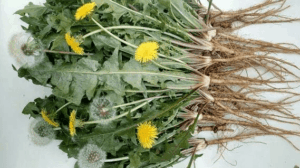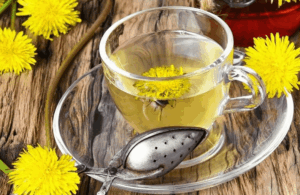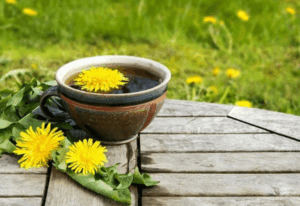Most people see dandelions as stubborn weeds growing through sidewalk cracks or across lawns. But for centuries, this sunny yellow flower has quietly earned its place in traditional wellness practices around the world. From Europe to Asia and North America, cultures have used dandelions for everything from soothing digestion to supporting the liver. Now, more Americans are rediscovering the dandelion as a simple, natural way to support everyday health.
Packed with nutrients, antioxidants, and plant compounds, dandelion may offer gentle support for the body when included as part of a balanced lifestyle. Let’s explore why this common backyard plant is considered one of nature’s most underestimated healers—and how to safely use it for wellness at home.

What Makes Dandelion a Natural Wellness Ally?
Dandelion (Taraxacum officinale) belongs to the sunflower family and grows easily in nearly every region of the United States. While often removed from gardens, this resilient plant is entirely edible and has been used in traditional herbal medicine for centuries.
What’s inside dandelion?
- Vitamins: A, C, E, and K
- Minerals: Potassium, magnesium, calcium, and iron
- Plant Compounds: Polyphenols, beta-carotene, and inulin (a gut-friendly fiber)
Each part of the plant—flower, leaf, and root—offers different health-supportive qualities. The leaves are typically used for their diuretic and digestive effects, the flowers for their antioxidant content, and the roots for liver and gut support.
Five Research-Supported Benefits of Dandelion
While dandelion is still being studied in modern clinical research, early findings and traditional uses point to several gentle health benefits. Here’s how dandelion may support your body:
1. Supports Liver and Gallbladder Function
Dandelion root has been traditionally used as a liver tonic, believed to support bile production and detoxification. Bile helps the body digest fats and remove waste products through the digestive system.

Potential benefits:
- Supports liver enzyme activity
- May aid gentle detoxification
- Encourages gallbladder flow and function
- One lab study published in Food and Chemical Toxicology found that dandelion root extract had a protective effect on liver cells exposed to toxins. While more human trials are needed, these early results support traditional uses.
2. Promotes Healthy Digestion
Both dandelion leaves and roots may support digestion through natural compounds that stimulate appetite and improve gut function.
Ways it may help:
- Acts as a mild natural laxative
- Supports breakdown of fats with bile stimulation
- Contains inulin, which feeds healthy gut bacteria
- If you occasionally experience bloating or irregular digestion, dandelion tea or greens might be worth adding to your diet in moderation.
3. Aids in Gentle Diuresis and Fluid Balance
Dandelion is known for its natural diuretic effect. Unlike some pharmaceutical diuretics, it doesn’t typically deplete the body’s potassium, which is important for muscle and heart health.

Possible outcomes of this effect:
- Reduces water retention
- Helps relieve temporary bloating
- May support kidney and urinary tract health
- A small human study published in Journal of Alternative and Complementary
- Medicine found that dandelion extract increased urination frequency without serious side effects.
4. Rich in Antioxidants That Protect Cells
Dandelion flowers and roots are loaded with antioxidants like polyphenols, flavonoids, and beta-carotene. These compounds help neutralize free radicals, which can damage cells and contribute to signs of aging.
Benefits of antioxidant protection:
- May support healthy aging
- Helps protect the skin from oxidative stress
- May play a role in cardiovascular and metabolic health
- Adding dandelion to a plant-rich diet could enhance your body’s natural defenses.
5. May Help Support Blood Sugar and Insulin Sensitivity
Early lab research suggests that dandelion may support healthy blood sugar levels by improving how sugar is absorbed and processed in the body. These effects have been seen primarily in animal models.

What it might do:
- Help regulate post-meal blood sugar
- Improve insulin response in early studies
- Offer mild metabolic support when used alongside a balanced diet
- This area is still being explored, and dandelion should not be used as a substitute for blood sugar medication.
How to Safely Use Dandelion at Home
Dandelion can be enjoyed in many forms—fresh, dried, roasted, or steeped into teas. It’s accessible and affordable, often growing in your own backyard. Just make sure it hasn’t been treated with herbicides or lawn chemicals before harvesting.
Ways to try dandelion at home:
1. Dandelion Tea
- Steep 1–2 teaspoons of dried dandelion root or leaf in hot water
- Steep for 5–10 minutes
- Enjoy once or twice a day
2. Fresh Dandelion Greens
- Toss into salads with lemon juice or apple cider vinegar
- Cook into soups or stir-fries
- Sauté with garlic and olive oil
3. Roasted Dandelion Root “Coffee”
- Roasted root has a nutty, earthy flavor
- Caffeine-free alternative to coffee
- Can be mixed with chicory or spices
4. Dandelion Supplements
- Capsules and tinctures are available in health stores
- Follow dosage instructions carefully
- Best used under guidance from a healthcare provider
Safety Considerations
While dandelion is generally considered safe in food-level amounts, there are a few things to be aware of:
Avoid or talk to your doctor before use if you:
- Are allergic to plants in the Asteraceae family (like ragweed)
- Are taking diuretics, blood pressure medication, or lithium
- Have gallbladder disease or bile duct blockage
- Are pregnant or breastfeeding (limited research available)
- Start small when trying dandelion for the first time and observe how your body reacts.
A Gentle Way to Reconnect with Nature’s Medicine
Sometimes, the best health helpers are already growing right in front of us. Dandelion’s bright petals and deeply rooted strength reflect what it offers to our bodies—gentle energy, detox support, and balance.
You don’t need to overhaul your routine to benefit. A simple cup of dandelion tea, a few fresh leaves in your lunch, or a roasted root brew in the evening could be the first step toward more natural wellness.

